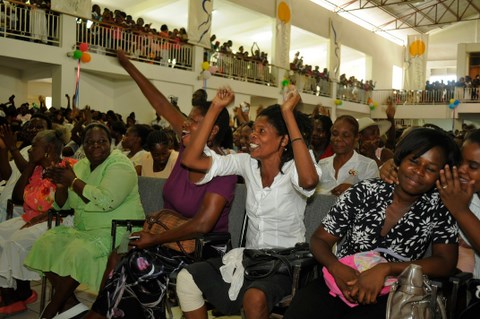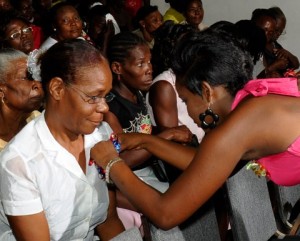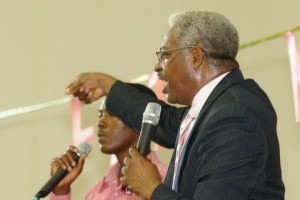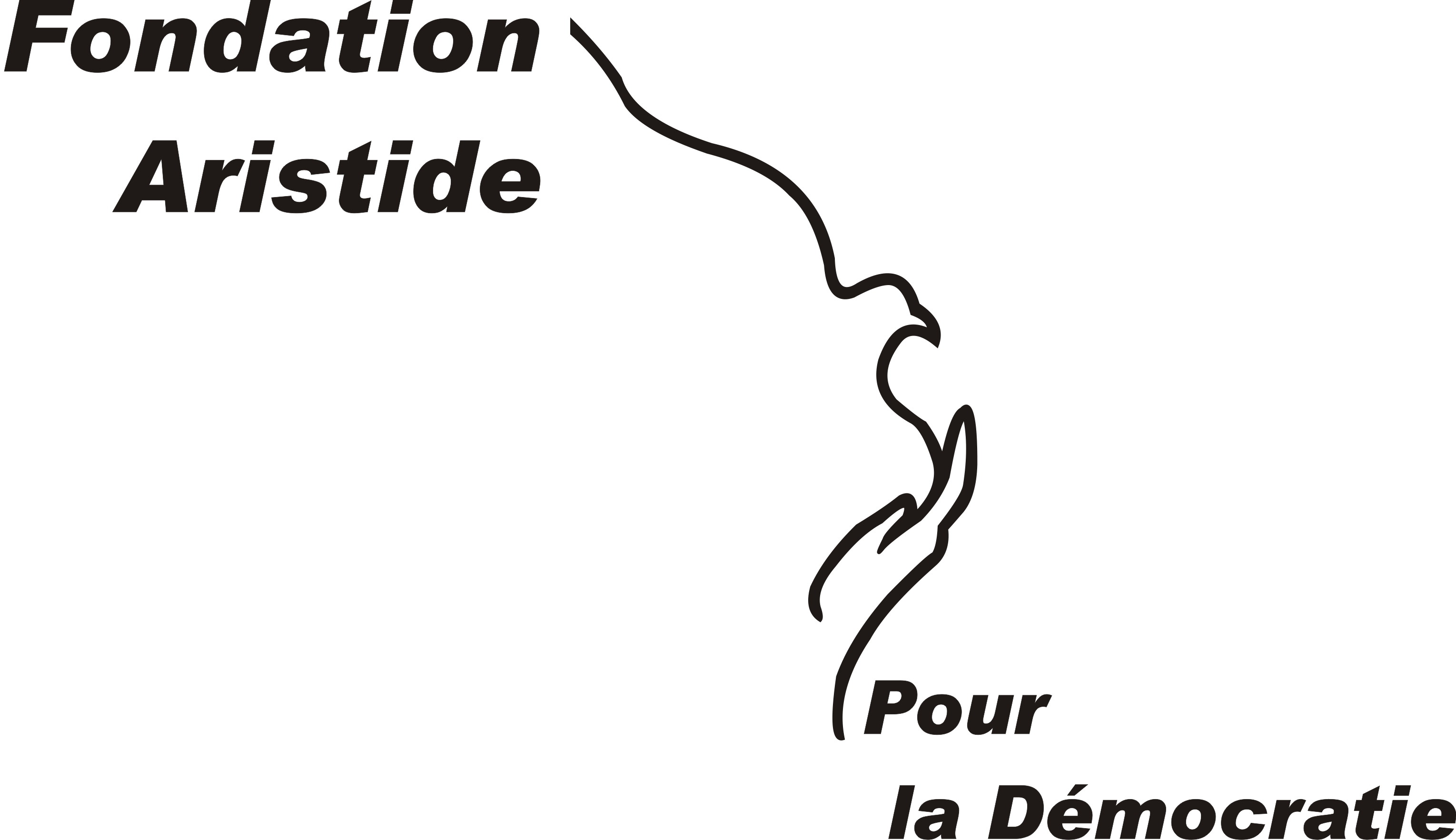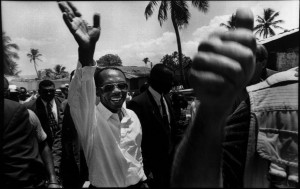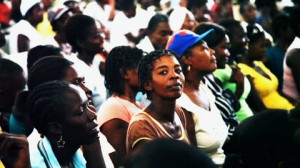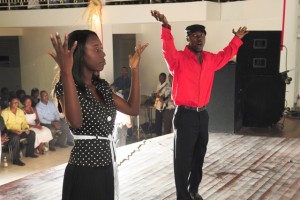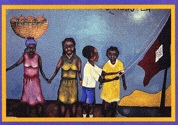
by Laura Flynn
On May 20th I sat down with ten young recently trained lay mental health-workers in the Aristide Foundation for Democracy’s Soulaje Lespri Moun project, to hear how the new project was going. In April these young people received training from a group of social workers from the University of Michigan. (Read an Account of this work by Leah James on the Huffington Post)
For the past eight weeks they’ve have been conducting mental health sessions in two refugee camps in Port-au-Prince. On the day we met in the courtyard of the foundation one-by-one they raised a hand to offer some testimony about the work they were doing.
Most described an initially rough reception in the camps, where most people in Port-au-Prince are still living in conditions that can only be described as inhuman. People are hungry and understandably skeptical about a project that offers mere words. Over time the Mental Health Workers had made inroads, and some of the people who had initially been most skeptical were now regulars at the sessions, or regularly brought new people to participate. Several told stories about people who were drinking or doing drugs to escape the grief and the trauma, and who had came back to say they’d stopped, they would come to talk instead. Many, many people returned to tell them they slept better after participating in the sessions, and after doing the regular breathing and self-soothing exercises that are a key component to the trainings. Some participants reported headaches or body aches were eased, and many people described improved relations with their families.
One woman who came to a session had been estranged from her husband since the quake. Part of the instructions in the mental health workshop is to go home and do the relaxation exercises with your family each night. Despite the estrangement, this woman had taken the direction to heart and so sought out her husband in the camp were both were living. She taught him the breathing and relaxation exercises she had learned – this in turn led to a reconciliation, which was then celebrated by the whole camp.

Read more
Filed under Update · Tagged with
Every year on the last Sunday of May (Haitian Mother’s Day) the Aristide Foundation for Democracy, holds a special event to honor mothers. Sunday May 30 the AFD welcomed 3,500 women to the auditorium of the Foundation for a very special day of communion and solidarity– to offer solace, and encouragement, and a chance to speak out to women representing mothers across Haiti.
The event was planned for 2,000 people, but an overflow crowd filled the balconies, hallways and rear of the auditorium.
The event opened with a multi-denominational religious ceremony – including a presentation by Pastor Eddie Hebron, an African-American Minister from Savannah, Georgia.
Three mothers, Gladys Delouis, a long time AFD staff member and women’s organizer, Merry Roche, the coordinator of the AFD Mobile Schools Program, and Madame Florence Agenor, a community organizer from Cite Soleil who spoke in the name of the mothers of Cite Soleil, rallied the crowd. All of them spoke of the hardships faced by Haitian mothers today. After losing family members, children, their homes, and whatever small businesses they might have had, are now suffering in the “tents of humiliation” where they have to sleep standing up when it rains. They also spoke of the courage and the endurance that women are showing in the face of this crisis.
Madame Agenor thanked Titid’s mother for giving them this “gwo garcon.” Everyone present was thrilled to have the opportunity to say loudly and clearly in the presence of several foreign delegations that they want an end to injustice, that Jean-Bertrand Aristide must return to his homeland to continue to work with them for social peace and justice for all Haitians.
Read more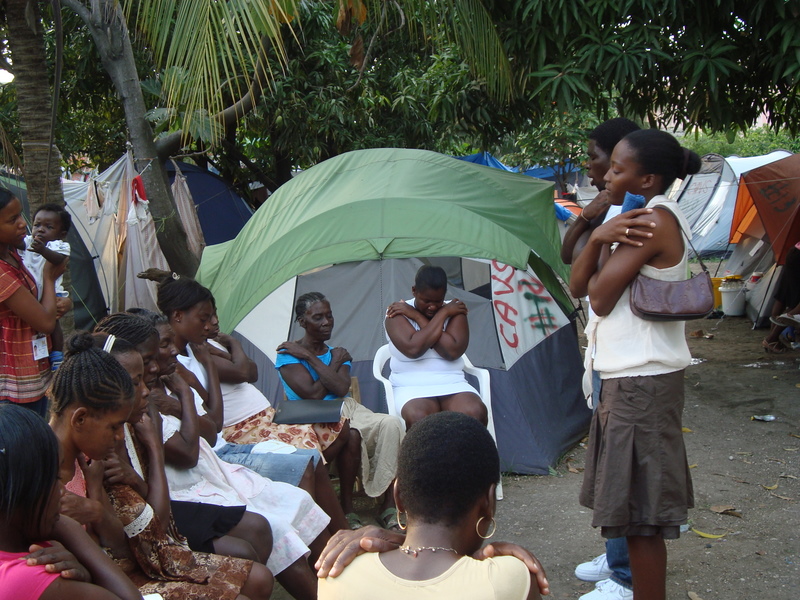
AFD Lay Mental Health Workers lead a workshop at a camp in Tabarre
Aristide Foundation Lay Mental Health Workers Lead Workshops in the Camps
Four months after January 12 the experience of that day — the terror and the losses — remain vivid and present in the minds of all Haitians who survived the quake. Nearly everyone has some degree of post-traumatic stress with hyper-vigilance, startle responses, sleep difficulties, intrusive memories, fear, anxiety, grief, and anger widespread. Even before the quake Haiti’s mental health structure was nearly non-existent. Right now for the majority of the population of Port-au-Prince, who are now living in tents in refugee settlements, mental health care is both inaccessible and foreign to their experience.
Beginning in late April the AFD in cooperation with a group of social workers and doctoral students from the University of Michigan began working together to to create a Haitian-model for lay mental health workers to reach people in the camps. Ten extraordinary young Haitian college students spent a week receiving training from Leah James, a social worker and doctoral candidate at the University of Michigan, and Dr. Todd Favorite and Dr. Mike
Messina, psychologists at the PTSD clinic at the Ann Arbor VA. (Read Leah’s Huffington Post Article Describing the evolution of this project here).
Read more
« Previous Page — Next Page »


